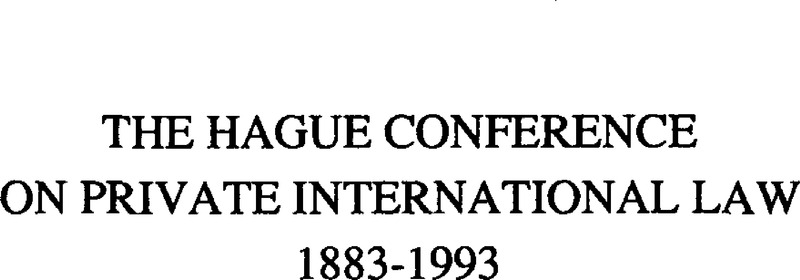No CrossRef data available.
Article contents
Preface
Published online by Cambridge University Press: 21 May 2009
Abstract

- Type
- Preface
- Information
- Copyright
- Copyright © T.M.C. Asser Press 1993
References
3. ‘I do not wish to hide from you the profound emotion which I feel in asking you to commence your work. It is one of the dreams of my youth which, if the signs do not mislead us, has just started on the road to realization’. Proceedings (Actes) of the opening Session of the Hague Conference, p. 26.
4. See the collection of articles published in celebration of the centenary of the Institut de droit international: Livre du Centenaire (1873–1973) (1973) pp. 18 and 22.
5. For a review of Mancini's role in the Institut de droit international, see De Nova, R., ‘Pasquale Stanislao Mancini (1817–1888)’, in Livre du Centenaire, op. cit. n. 4, pp. 3–10;Google Scholar as for Asser, see Voskuil, C.C.A., ‘T.M.C. Asser (1838–1913)‘, in Livre du Centenaire, op. cit. n. 4, pp. 11–31.Google Scholar
6. Livre du Centenaire, op. cit. n. 4, pp. 22–23.
7. See infra, ‘Memorandum addressed by the Netherlands Government’.
8. For a brief note on this sad event, see the congress report Current Trends of Conflicts of Laws in Central-Eastern Europe, University of Trieste (1984) pp. 5–7.Google Scholar
9. Four Sessions were held around the turn of the century: in 1893, 1894, 1900 and 1904.
10. Even though the early Conventions have all been replaced by Conventions drafted subsequently, it is interesting to note, that during die initial stage, the Hague Conference prepared Conventions on civil procedure (1894, signed in 1896 and replaced in 1905), on legal conflicts regarding marriage as well as on jurisdiction and conflicts in matters of divorce and separation, and in matters of custody over minors (all three in 1900, signed in 1902); furthermore on conflicts of law affecting the personal rights and duties between spouses and matrimonial property rights, as well as on legal restraint and similar protection measures (1902, signed in 1905). By any standards a most impressive achievement.
11. Here one may quote (in English translation) some of the words spoken by L.I. de Winter when, shortly after the death of Offerhaus, he took over the Presidency of a special Session of die Hague Conference, convened in 1966:
‘The importance of Mr Offerhaus for the Hague Conference could only be appreciated when placed in relation to the first President of die Conference, the Member of the Council of State, Mr Asser. President Asser initiated the work on the unification of private international law and die four sessions that he presided over not only produced phenomenal results, but moreover, laid the foundations for the worldwide reputation which, even in our days, the Hague Conference enjoys.
After the last World War, when the world had all but forgotten about even the existence of the Hague Conference, President Offerhaus revived the Conference; and with the spirit and the drive of a true missionary he inspired the legal scholars dedicated to private international law with great enthusiasm for the resumption of the work on the unification.’
Proceedings (Actes et Documents) of the special Session (13—26 April 1966), The Hague (1969) p. 161. See also Proceedings of the 11th Session (7—26 October 1968), The Hague (1971) p. 14.




